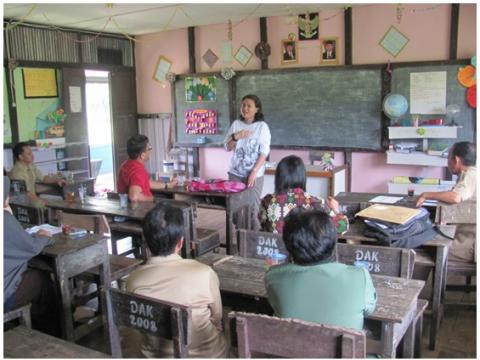Breakthrough in Sasak Primary School 07

The new learning approach called Senang, Efektif, Ramah, dan Unik (SERU or Joyful, Effective, Friendly and Unique) and the Green Harmony has catapulted the Primary Public School 07 in Sasak village in Sambas district in West Kalimantan province into one of the best primary schools in the district. The school secured the fourth ranking at the district level during the last schooling year and one of its students also secured perfect score (10) for Mathematics during the state exam.
The extra-ordinary results were the fruits of the hard-work and dedication of all the teachers and students in implementing the new approach called SERU and the Green Harmony.
Mr Iyus, the headmaster, also celebrated the rising support from the parents as they started witnessing the quality improvement on the education of their children. "About 85 percent of the parents attended the parent-teacher gathering when we invite them for such a meeting."
This is something that had never taken place in the past because many of the students' parents lived quite far from the school. Mr Iyus and other teachers acknowledged the transformation took place not long after the school implemented the SERU education approach and the Green Harmony and also asked all the teachers to make the Teaching Implementation Plan.
The SERU approach, developed based on the Active, Joyful, Effective Learning approach, has given greater opportunity for the students to study in groups, intensify discussion, and to explore their environment to enrich their learning. The Green Harmony tried to develop the characters and values of the students, particularly relating to their appreciation toward their own-selves, their colleagues, and also their environment.
Wahana Visi Indonesia, a special partner of humanitarian organization World Vision, helped introduced the new approaches, including providing intensive training for the teachers to be able to implement the new programs.
Yostina (45), one of the teachers, underlined the new approaches not only have improved the motivation of the students to master their lessons and to learn new things, but have also motivated all the teachers to explore more effective way to develop their students.
"We also do not consider preparing the teaching plan as burden. We consider it a part of our task to perform well in executing our teaching process in the classes," she said.
"The students have been very active in discussions with their friends and more curious to learn as much as possible from the lessons and their environment," she noted. "It is so different from the more conventional approach in the past."
"Their seating arrangement has been changed into group seating which has given them the opportunity to better know each others, to express their thoughts, and to have discussion on various topics," said Ms Yos. "This has made the learning process very lively."
Jailani, another teacher recently joining the school, also started enjoying the benefit of the new learning approaches, moreover when he has been trained about the approaches by Wahana Visi. He was very enthusiastic when his students positively responded to some creative teaching instruments that he has made from used things, such as plastic bottles and paper.
"They love the creative handicrafts and soon produced a lot of creative handicrafts by themselves. Their creations have been used to decorate their classrooms," he said.
Endang, the youngest teacher, noted the new approaches have helped the students to be much more discipline and productive.
"Previously, there was an idle plot of land at the side of the school. The students have transformed the land as a garden planting various plants which can be used to cure some illnesses, and also various flowers and other decorative plants," she said.
All the efforts have started showing real results. The quality of education at the primary school in Sasak has significantly been improving. It is now among the best primary schools in the Sambas district. (Prepared by Simon Sinambela, Education Coordinator Wahana Visi Indonesia in Sambas office | Edited and Translated by Hendro Suwito, Senior Editor World Vision Indonesia)